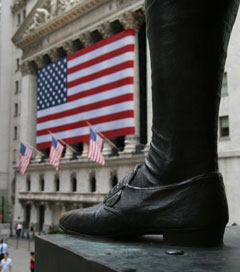The dominant story of the current political debate is that the government is broke. We can’t afford to pay for public services, put people to work, or service the public debt. Yet as a nation, we are awash in money. A defective system of money, banking, and finance just puts it in the wrong places.
Raising taxes on the rich and implementing financial reforms are essential elements of the solution to our seemingly intractable fiscal and economic crisis. Yet proposals currently on the table fall far short of the need.
A newly released report of the New Economy Working Group, coordinated by the Institute for Policy Studies in Washington, DC, goes beyond the current debate to call for a deep restructuring of the institutions to which we as a society give the power to create and allocate money. How to Liberate America from Wall Street Rule spells out the steps required to rebuild a system of community-based and accountable institutions devoted to financing productive activities that create good jobs for Americans and generate real community wealth.
Despite the financial crash of 2008, the financial assets of America’s billionaires and the idle cash of the most profitable corporations are now at historic highs. Their biggest challenge is figuring out where to park all their cash.Over the past 30 years, virtually all the benefit of U.S. economic growth has gone to the richest 1 percent of Americans. Effective tax rates for the very rich are at historic lows and many of the most profitable corporations pay no taxes at all.
Corporations are using their stores of cash primarily to buy back their own stock, acquire control of other companies, invest in off-shoring yet more American jobs, and pay generous dividends to shareholders and outsized bonuses to management.Unfortunately, most of those who hold the cash and the corporations they control have lost interest in long-term investments that build and expand strong enterprises. The substantial majority of trades in financial markets are made by high-speed computers in securities held for fractions of a second. Business pundits still refer to this trading as investment. It bears no resemblance, however, to the investment required to put people to work rebuilding a strong America.
Help fight ignorance. Click here for daily Truthout email updates.
It was not always so. In response to the Great Depression, our country enacted financial reforms that put in place a system of money, banking, and investment based on community banks, mutual savings and loans, and credit unions. These institutions provided financial services to local Main Street economies that employed Americans to produce and trade real goods and services in response to community needs and opportunities.
This system, which Wall Street interests dismiss as quaint and antiquated, financed the U.S. victory in World War II, the creation of a strong American middle class, an unprecedented period of economic stability and prosperity, and the investments that made America the world’s undisputed industrial and technological leader.
The consequences include the erosion of the middle class, an extreme concentration of wealth and power, a costly financial collapse, persistent high unemployment, housing foreclosures, collapsing environmental systems, the hollowing out of U.S. industrial, technological, and research capacity, huge public and international trade deficits, and the corruption of our political institutions.In the 1970’s Wall Street interests began pushing a deregulation agenda that led to a transfer of financial power from Main Street to Wall Street. Wall Street’s mega-banks lost interest in real investment and developed a new business model. They now specialize in charging excessive fees and usurious interest rates, providing leverage to speculators, speculating for their own accounts, luring the unwary into mortgages they cannot afford, bundling junk mortgages to sell them as triple-A securities, betting against the clients to whom they sell the overrated securities, extracting subsidies and bailouts from government, laundering money from drug and arms traders, and offshoring their profits to avoid taxes.
Wall Street profited at every step and declared its experiment with deregulation and tax cuts for the wealthy a great success. It now argues for extending the same measures even further.
How to Liberate America from Wall Street Rule spells out details of a six-part policy agenda to rebuild a sensible system of community-based and accountable financial services institutions.
- Break up the mega-banks and implement tax and regulatory policies that favor community financial institutions, with a preference for those organized as cooperatives or as for-profits owned by nonprofit foundations.
- Establish state-owned partnership banks in each of the 50 states, patterned after the Bank of North Dakota. These would serve as depositories for state financial assets to use in partnership with community financial institutions to fund local farms and businesses.
- Restructure the Federal Reserve to function under strict standards of transparency and public scrutiny, with General Accounting Office audits and Congressional oversight.
- Direct all new money created by the Federal Reserve to a Federal Recovery and Reconstruction Bank rather than the current practice of directing it as a subsidy to Wall Street banks. The FRRB would have a mandate to fund essential green infrastructure projects as designated by Congress.
- Rewrite international trade and investment rules to support national ownership, economic self-reliance, and economic self-determination.
- Implement appropriate regulatory and fiscal measures to secure the integrity of financial markets and the money/banking system.
How to Liberate America from Wall Street Rule is the product of extended discussions among representatives of a diverse group of organizations committed to deepening and reframing the conversation on financial reform to focus attention on the serious financial system restructuring required to build a strong new American economy adequate to the social and environmental challenges of the 21st century. It may be freely shared, reproduced and distributed with appropriate citations.
